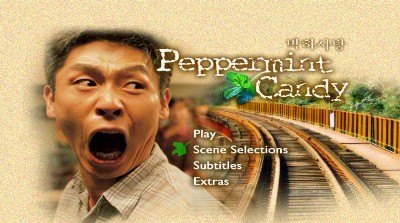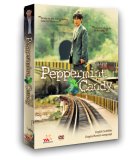| Reviews & Columns |
|
Reviews DVD TV on DVD Blu-ray 4K UHD International DVDs In Theaters Reviews by Studio Video Games Features Collector Series DVDs Easter Egg Database Interviews DVD Talk Radio Feature Articles Columns Anime Talk DVD Savant Horror DVDs The M.O.D. Squad Art House HD Talk Silent DVD
|
DVD Talk Forum |
|
|
| Resources |
|
DVD Price Search Customer Service #'s RCE Info Links |
|
Columns
|
|
|
Peppermint Candy
YA Entertainment // Unrated // August 17, 2005
List Price: $24.95 [Buy now and save at Amazon]
Fragmented storylines can be quite intriguing, even though the practice has become an exhausted medium with modern films. From Nolan and Lynch's masterful works early in the new millennium, breaking and rearranging narratives have become the technique du jour. Peppermint Candy, a Korean film from Lee Chang-dong, comes with a careless label "similar to Memento". How unfair this simple classification is breaches the unfathomable, and that is coming from an avid fan of Nolan's work.
This stark drama of deception, corruption, and dissolute love shares but one element with the aforementioned film: a unique time structure told in backwards form. From there, Lee Chang-dong's tour de force takes a myriad of different paths that are heart wrenching, brutal, and emotionally shattering. Peppermint Candy is a Korean character exposition that longs for savoring as a marvel of historical and emotional wonder.
The Film:

Judging by the frightful, desperate expression on suicidal Yong-Ho's face as a train violently barrels towards his steadfast posture, it's obvious from the start that this will not be a joyful tale. Opting for the quick and easy way out seems like the wrong decision, especially since nothing substantial has been revealed about his past as of yet. The only concrete fact is that he has retreated to the reunion point of a group of old friends called The Honeycomb Club from twenty years back. Amidst this jubilant celebration where he is the only morose soul, he grows resolute to end his life.
Such an innocent desperation sets the tone for a tale that spans across this very twenty years since the group of friends first met. What we discover is that Yong-Ho isn't the slightest bit innocent; fraught with emotional hunger, yes, but far from innocent. His path to desolation spirals amidst a plethora of weathering scenarios. From his early days as a soldier to the years he developed from a hardened cop to a stringent, heartless executive in business, Yong-Ho's turbulent journey unravels with keen exposition. This is a harrowing journey through a man's downfall amidst the molding landscape and socially evolving state of Korea.
Peppermint Candy's level of effectiveness comes firmly rooted within its focused reverse time mechanic. The film leapfrogs backwards throughout Yong Ho's tumultuous past, starting with his climactic introduction in the late '90s. With the looming ideal that this man's death is caused by the shaky voyage ahead, Peppermint Candy brings the mood to full-alert - each nuance and detail might unravel a reasoning as to why such a man might take his own life. Peppermint Candy, interesting enough, isn't meant to be a paint-by-numbers jerking suspense; it is a stark drama told in an unique fashion that doesn't rely on small, subtle details to "solve the puzzle". This film is not a puzzle for solving, but a savory expose ripe for concentration.

However, Lee Chang-dong's portrait of a developing Korea wouldn't be near as effective if told in a linear fashion. Molding this film around the mechanic of a reverse-fading corruption adds a fervent intrinsic focus that can make the viewer empathize and, in a sense, reminisce with Yong-Ho about his past. His heartbreaks and experiences stack atop the introductory scene like a pile of dry logs upon a dimly inflamed effigy. As the layers grow more profound and rich, so does the engulfing, raging pyre. Lee Chang-dong's usage of symbolism across time grasps the concentration of the viewer in the later stages of Yong-Ho's life. Seeing how the essence of profound items within his life developed is all quite reflective, as if tapping into his reminiscent portion of his mind.
It's hard to start with such a bitter, snarling protagonist. Essentially, Yong-Ho's resolute decisions at the beginning of the film and his recently past activities do not aid the audience in standing behind this individual early in the film. This can lend a very cold nature about Yong-Ho and, in turn, might lead to a vacant empathy from some. Why is the life of such an embittered individual worthy enough to vest interest? It's scarce at the beginning, but there are flickers of propriety even in the famished last days of his wicked life that give very small sparks of hope. Though extremely sparse early on, this hope is still substantial enough to grasp onto and stick with throughout the film.
Peppermint Candy doesn't just play all the right chords, but slams them in aching fashion. Well performed and finely crafted, this juxtaposition of cynical weathering and romantic degradation harnesses everything this film could possibly represent. From the overall usage of the visual and conceptual meaning behind trains and the infamous candy to the painstaking turmoil firmly rooted within all females amidst Yong-Ho's life, Lee Chang-dong's film aggressively attacks the essence of a lost man and his weaving, dark twenty-year journey. A modern masterwork, Peppermint Candy whole-heartedly achieves disturbance, passion, tenderness, corruption and devastating heartbreak through a historical, beautifully turbulent journey within Korea's grasp.
The DVD:

This DVD comes handsomely packaged from YA Entertainment in a clear amaray keepcase with artwork both on the outside and inside that becomes visible when opened. An attractive matte slipcover is included, as well as a nicely detailed booklet insert labeled a "Reference Guide". In regards to standard keepcase packaging, this DVD is one of a group of personal favorites.
The Video:
Peppermint Candy is presented in an anamorphic widescreen image that tolerably portrays this wonderful film. The subtle, natural colors appeared strong, though a bit muted and bland. Darker scenes, for the majority, did appear to be deep without a horrible level of distortion and grain in the depths. Detail is where this transfer suffers a bit. It's a fairly blurry image that can lose a lot of detail within the haziness. A few dust and scratches danced across the print as well. Needless to say, Peppermint Candy could look a lot better; however, even though it's not stellar, there aren't any terrible color distortions or heavily noticeably blemishes that come close to offensive.
The Audio:
Presented in a Korean Dolby 2.0 presentation, Peppermint Candy sounded decent enough. Dialogue was crisp and clean, though a few voices get soft here and there, especially during Yong-Ho's "law enforcement" scenes. The film's beautiful score sounded quite nice, as did the very low levels of ambient sound effects. A surround audio presentation would have been a very welcome addition; however, this aural accompaniment isn't too shabby. Clear, white optional subtitles are available in English that harness the dialogue with comfortable quality.
The Extras:
Practically nothing, sadly.
An Original Trailer, presented in a non-anamorphic scathingly bad transfer, displays a fair amount of the film's strong points in a short time without revealing plot points. Other than that, there is a Scene Selection menu and Sneak Peeks into two other films from YA entertainment: Singles and Turning Gate. If further bonus material is desired, retreat to the Reference Guide that has plenty of textual info.
-----
Final Thoughts:
For anyone interested in stark foreign drama, Peppermint Candy is essential viewing. Almost every natural, conceivable human emotion is crammed into this moving, poignant insight into Yong-Ho's plummet to a jaded end. If other editions were readily available for this disc, then the packaging and performance of the DVD would come merely recommended. However, since this copy is the best edition easily accessible, YA Entertainment's presentation of Peppermint Candy comes Highly Recommended, purely for the availability to view the film itself. Make no mistake, this is a film worth seeking out.
Thomas Spurlin, Staff Reviewer -- DVDTalk Reviews | Personal Blog/Site
This stark drama of deception, corruption, and dissolute love shares but one element with the aforementioned film: a unique time structure told in backwards form. From there, Lee Chang-dong's tour de force takes a myriad of different paths that are heart wrenching, brutal, and emotionally shattering. Peppermint Candy is a Korean character exposition that longs for savoring as a marvel of historical and emotional wonder.
The Film:

Judging by the frightful, desperate expression on suicidal Yong-Ho's face as a train violently barrels towards his steadfast posture, it's obvious from the start that this will not be a joyful tale. Opting for the quick and easy way out seems like the wrong decision, especially since nothing substantial has been revealed about his past as of yet. The only concrete fact is that he has retreated to the reunion point of a group of old friends called The Honeycomb Club from twenty years back. Amidst this jubilant celebration where he is the only morose soul, he grows resolute to end his life.
Such an innocent desperation sets the tone for a tale that spans across this very twenty years since the group of friends first met. What we discover is that Yong-Ho isn't the slightest bit innocent; fraught with emotional hunger, yes, but far from innocent. His path to desolation spirals amidst a plethora of weathering scenarios. From his early days as a soldier to the years he developed from a hardened cop to a stringent, heartless executive in business, Yong-Ho's turbulent journey unravels with keen exposition. This is a harrowing journey through a man's downfall amidst the molding landscape and socially evolving state of Korea.
Peppermint Candy's level of effectiveness comes firmly rooted within its focused reverse time mechanic. The film leapfrogs backwards throughout Yong Ho's tumultuous past, starting with his climactic introduction in the late '90s. With the looming ideal that this man's death is caused by the shaky voyage ahead, Peppermint Candy brings the mood to full-alert - each nuance and detail might unravel a reasoning as to why such a man might take his own life. Peppermint Candy, interesting enough, isn't meant to be a paint-by-numbers jerking suspense; it is a stark drama told in an unique fashion that doesn't rely on small, subtle details to "solve the puzzle". This film is not a puzzle for solving, but a savory expose ripe for concentration.

However, Lee Chang-dong's portrait of a developing Korea wouldn't be near as effective if told in a linear fashion. Molding this film around the mechanic of a reverse-fading corruption adds a fervent intrinsic focus that can make the viewer empathize and, in a sense, reminisce with Yong-Ho about his past. His heartbreaks and experiences stack atop the introductory scene like a pile of dry logs upon a dimly inflamed effigy. As the layers grow more profound and rich, so does the engulfing, raging pyre. Lee Chang-dong's usage of symbolism across time grasps the concentration of the viewer in the later stages of Yong-Ho's life. Seeing how the essence of profound items within his life developed is all quite reflective, as if tapping into his reminiscent portion of his mind.
It's hard to start with such a bitter, snarling protagonist. Essentially, Yong-Ho's resolute decisions at the beginning of the film and his recently past activities do not aid the audience in standing behind this individual early in the film. This can lend a very cold nature about Yong-Ho and, in turn, might lead to a vacant empathy from some. Why is the life of such an embittered individual worthy enough to vest interest? It's scarce at the beginning, but there are flickers of propriety even in the famished last days of his wicked life that give very small sparks of hope. Though extremely sparse early on, this hope is still substantial enough to grasp onto and stick with throughout the film.
Peppermint Candy doesn't just play all the right chords, but slams them in aching fashion. Well performed and finely crafted, this juxtaposition of cynical weathering and romantic degradation harnesses everything this film could possibly represent. From the overall usage of the visual and conceptual meaning behind trains and the infamous candy to the painstaking turmoil firmly rooted within all females amidst Yong-Ho's life, Lee Chang-dong's film aggressively attacks the essence of a lost man and his weaving, dark twenty-year journey. A modern masterwork, Peppermint Candy whole-heartedly achieves disturbance, passion, tenderness, corruption and devastating heartbreak through a historical, beautifully turbulent journey within Korea's grasp.
The DVD:

This DVD comes handsomely packaged from YA Entertainment in a clear amaray keepcase with artwork both on the outside and inside that becomes visible when opened. An attractive matte slipcover is included, as well as a nicely detailed booklet insert labeled a "Reference Guide". In regards to standard keepcase packaging, this DVD is one of a group of personal favorites.
The Video:
Peppermint Candy is presented in an anamorphic widescreen image that tolerably portrays this wonderful film. The subtle, natural colors appeared strong, though a bit muted and bland. Darker scenes, for the majority, did appear to be deep without a horrible level of distortion and grain in the depths. Detail is where this transfer suffers a bit. It's a fairly blurry image that can lose a lot of detail within the haziness. A few dust and scratches danced across the print as well. Needless to say, Peppermint Candy could look a lot better; however, even though it's not stellar, there aren't any terrible color distortions or heavily noticeably blemishes that come close to offensive.
The Audio:
Presented in a Korean Dolby 2.0 presentation, Peppermint Candy sounded decent enough. Dialogue was crisp and clean, though a few voices get soft here and there, especially during Yong-Ho's "law enforcement" scenes. The film's beautiful score sounded quite nice, as did the very low levels of ambient sound effects. A surround audio presentation would have been a very welcome addition; however, this aural accompaniment isn't too shabby. Clear, white optional subtitles are available in English that harness the dialogue with comfortable quality.
The Extras:
Practically nothing, sadly.
An Original Trailer, presented in a non-anamorphic scathingly bad transfer, displays a fair amount of the film's strong points in a short time without revealing plot points. Other than that, there is a Scene Selection menu and Sneak Peeks into two other films from YA entertainment: Singles and Turning Gate. If further bonus material is desired, retreat to the Reference Guide that has plenty of textual info.
-----
Final Thoughts:
For anyone interested in stark foreign drama, Peppermint Candy is essential viewing. Almost every natural, conceivable human emotion is crammed into this moving, poignant insight into Yong-Ho's plummet to a jaded end. If other editions were readily available for this disc, then the packaging and performance of the DVD would come merely recommended. However, since this copy is the best edition easily accessible, YA Entertainment's presentation of Peppermint Candy comes Highly Recommended, purely for the availability to view the film itself. Make no mistake, this is a film worth seeking out.
|
| Popular Reviews |
| Sponsored Links |
|
|
| Sponsored Links |
|
|
| Release List | Reviews | Shop | Newsletter | Forum | DVD Giveaways | Blu-Ray | Advertise |
|
Copyright 2024 DVDTalk.com All Rights Reserved. Legal Info, Privacy Policy, Terms of Use,
Manage Preferences,
Your Privacy Choices | |||||||















